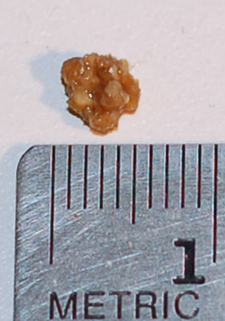7 Conditions Surprisingly Linked to Obesity
-

While obesity’s link to heart disease, stroke, type 2 diabetes and certain types of cancer is well known and widely publicized, some obesity-related diseases fly under the radar.
One reason for this is that we tend to think of obesity as a question of image; but this is wrong. “It’s important to realize that obesity is an issue of health, not appearance,” says Scott Kahan, MD, MPH, Director, National Center for Weight and Wellness in Washington DC. “The health consequences of obesity occur via physiologic, anatomic and hormonal pathways.”
In all, more than 80 diseases and conditions are linked to obesity. Here are seven that may surprise you and encourage you to win the battle of the bulge once and for all.
-
1. Infertility

Having trouble conceiving? Your weight may be the issue, says Dr. Scott Kahan. “Obesity increases the likelihood of infertility by hormonal pathways. Adipose (fat) cells are very active…and obesity leads to several hormonal changes.”
Ultimately, this can predispose a person to insulin resistance and diminished or absent ovulation.
-
2. Hearing Loss

Now hear this: If you are obese and tend to carry extra pounds around your waistline, you may be more likely to develop hearing loss, a new study suggests. In a study of 68,000 women participating in the Harvard Nurses’ Health Study, one in six women reported hearing loss during the study period, and those with a higher body mass index (BMI) or larger waist circumference were more likely to have hearing problems than their thinner counterparts. The findings, published in the December issue of the American Journal of Medicine, held even after researchers controlled for other factors known to affect hearing, such as cigarette smoking, the use of certain medications and diet.
-
3. Kidney Stones

By RJHall, via Wikimedia Commons
“Obesity increases the risk of kidney stones because obesity leads to elevated production of uric acid and more acidic urine, both of which drive the formation of stones,” says Dr. Scott Kahan. These are some of the same reasons that obese or overweight people are more likely to develop gout, a type of arthritis that occurs when uric acid builds up in the blood, causing painful inflammation in the joints.
-
4. Asthma

By United States National Institute of Health: Heart, Lung and Blood Institute, via Wikimedia Commons
Obesity can increase a person’s chance of developing asthma, and it can also make asthma symptoms (such as breathlessness and wheezing) worse. Genes linked to chronic inflammation in asthma may be more active in people who are obese, according to research published in Obesity. According to this study, people who had gastric bypass surgery showed reductions in the asthma-related genes after they lost weight.
-
5. Breast Cancer Death

By Federal Government, via Wikimedia Commons
Obesity is linked to many types of cancer, including postmenopausal breast, colorectal, endometrial, esophageal, kidney, gallbladder and pancreatic cancers. Results of a recent study showed that younger women who are obese have a 34 percent higher risk of dying from their breast cancer. The new study is slated for presentation at the annual meeting of the 2014 American Society of Clinical Oncology.
-
6. Ovarian Cancer

By Benjamin Ragheb, via Flickr
Being overweight or obese may increase your risk for ovarian cancer, a new study shows. The report, released by the American Institute for Cancer Research and World Cancer Research Fund, is the first to find that being overweight may cause ovarian cancer. The researchers estimated a 6 percent increase in ovarian cancer risk per five point increase in BMI. Exactly how the two are linked is not fully understood, but obesity affects hormones known to be involved in the cancer process and it also leads to insulin resistance and high levels of insulin as well as a chronic inflammation. Inflammation has been implicated in ovarian cancer development.
-
7. Psoriasis

Doctors have long suspected that people with the inflammatory skin disease psoriasis are more susceptible to obesity, and that obesity can also make psoriasis symptoms worse. The common denominator is likely inflammation. Losing weight, however, may ease psoriasis and improve quality of life. In one study, published in JAMA Dermatology, individuals in the weight-loss group reported less stinging and burning, were less likely to be embarrassed by psoriatic plaques and were less affected by psoriasis in their everyday lives than were their counterparts who did not lose weight as part of the study.








